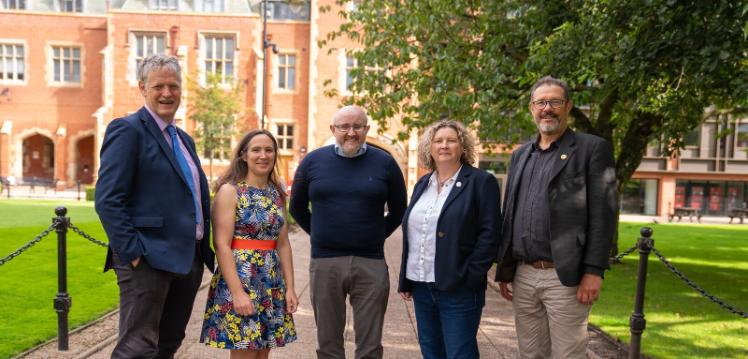Study from Queen’s University Belfast Investigates the Persistent Presence of Paramilitary Groups in NI
In the research paper, “Understanding the Persistence of Armed/Paramilitary Groups in Northern Ireland”, the team have proposed a model with three key factors that describe the variety of roles and functions which armed groups play in contemporary society and help to explain their persistence and adaptability, 30 years after the ceasefires by major Republican and Loyalist paramilitary groups.
Key Factors:
- Legitimacy – Armed and paramilitary activity in Ireland, and specifically in Northern Ireland, has always drawn legitimacy from the historical narrative of a political cause and/or in defence of a community. Narratives are structured along lines of historic religious identity, shaped by class and locality. Although formally illegal, these groups are often informally recognised and consulted, blending into the social fabric through traditions, rituals, and storytelling.
- Utility – The existence of a shadow bureaucracy with a presence in local communities makes armed and paramilitary groups a detrimental factor in many areas. Their involvement in community leadership, and illegal activities including alternative justice mechanisms, supply of illegal drugs, and money lending, maintains their relevance in many communities.
- Threat – These groups exert a degree of control of community activity and resource allocation, creating fear through the application of threat and coercion.
Although manifested differently over time, the three factors are important both in explaining why groups persist through changing circumstances and indicate the issues which must be addressed to enable a successful transition from paramilitarism in communities. The paper could be used to inform the development of future public policy on this issue.
Dr Brendan Sturgeon from Queen’s said: “Paramilitarism has created enduring practical and analytical challenges in Northern Ireland. The practical challenges are well known and are regularly reported on by the local media. The analytical challenges often receive less focus but have a direct impact on how we respond to the aforementioned practical challenges. It is our feeling that by taking the time to carefully address the analytical issues related to this matter, we will be in a better position to challenge the continuing existence of paramilitarism in Northern Ireland. Our model is a direct attempt to do this.”
Professor Duncan Morrow from Ulster University commented: “Paramilitarism has a long history in communities. This model suggests that real transition will require a multi-faceted approach involving political leadership, partnership working between multiple agencies and communities to provide services to communities and a robust problem-solving approach to eliminate coercive control.”
The research team have been collaborating since 2020 under the banner of the Northern Ireland Peace & Conflict Group.
Adele Brown, Director of cross-Executive Tackling Paramilitarism, Criminality and Organised Crime Programme said: “Today’s report contributes to the growing body of work which articulates and better understands the continuing impact of paramilitarism on our society. The Programme is committed to working with academia and practitioners to ensure informed solutions to tackling paramilitarism both in the here and now and to break the cycle of harm for future generations.”
Lucy Geddes from Co-operation Ireland commented: “A key challenge in addressing paramilitary harm is understanding the problem we are trying to resolve as it morphs over time and location. I firmly believe communities need to be at the heart of driving change. This model will inform the development of practical solutions to the continuation of paramilitary harm.”
The paper was launched during an event hosted by ARK, Northern Ireland’s Social Policy hub, at Queen’s University Belfast on Wednesday 28 August.

